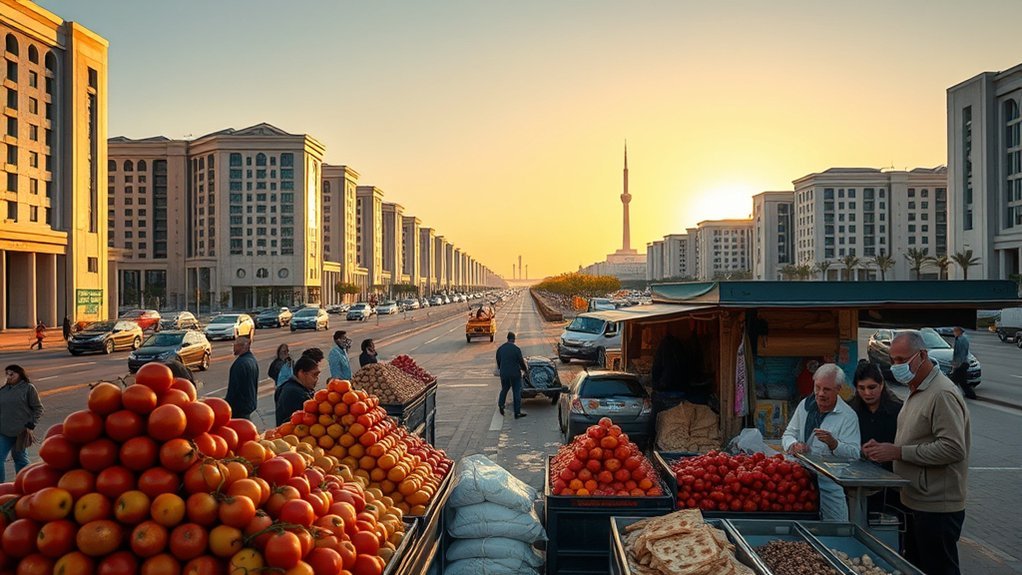You’ll typically need about $1,700–1,800 a month to live comfortably in Turkmenistan, though costs vary by city and lifestyle. Rent—especially in Ashgabat—drives most of the budget, with city-center one-bedrooms far pricier than outskirts. Groceries and local transport are relatively cheap, utilities and internet moderate, and dining out can add up quickly. Average local wages struggle to match costs, so plan housing and food choices carefully; keep going to see specific numbers and saving tips.
Overview of Average Living Expenses
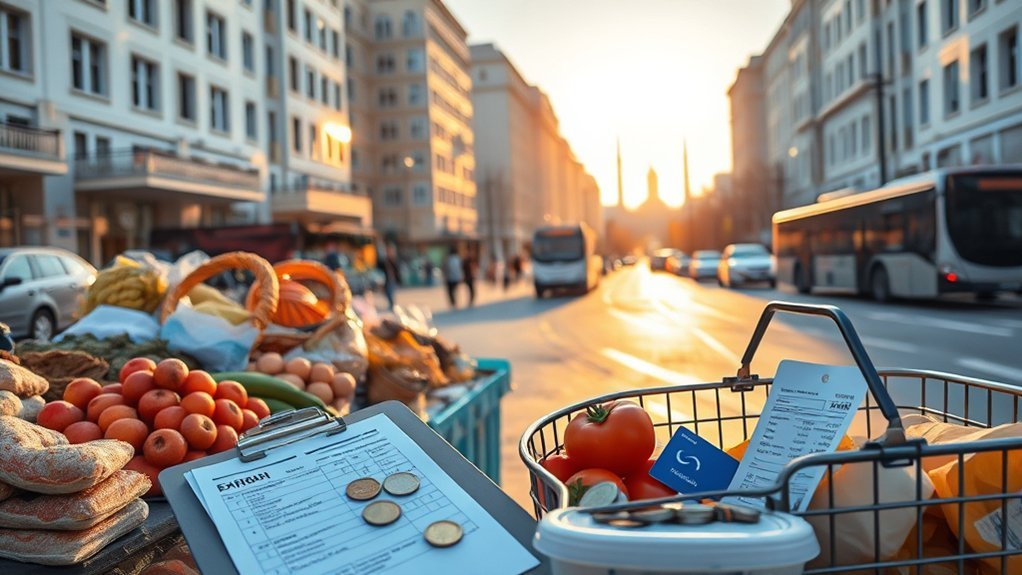
Although Turkmenistan can feel affordable in some areas, you’ll generally pay more than the global average: the country’s estimated cost of living is about $1,793, or 1.57 times the world norm.
Although some costs feel low, Turkmenistan’s overall living expenses run about $1,793 — 1.57× the world average.
You’ll notice the Cost of Living is driven by a few key line items: city-center rent can be steep, while transport and utilities stay relatively low.
For daily expenses, a lunch menu at about $27.3 and a mid-range dinner for two near $84.9 add up faster than you might expect compared with regional peers.
Local transport is cheap — single tickets at $0.14 and a monthly pass around $8.52 — which helps if you’re commuting.
Basic utilities for one person average roughly $47.3 per month, and internet at about $103 is a notable fixed cost.
Housing and Rental Market Insights
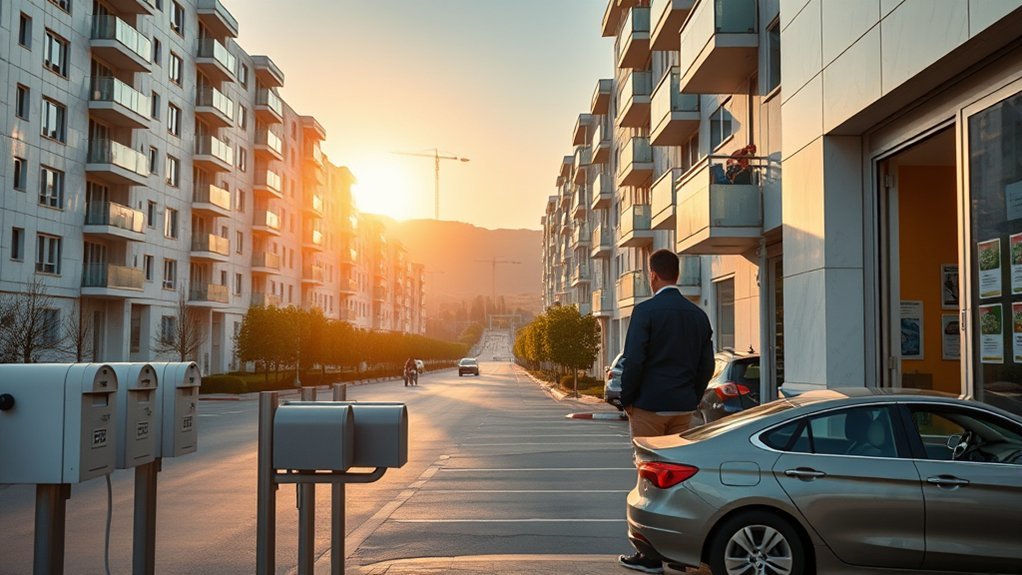
Because housing costs in Turkmenistan skew high relative to local wages, you’ll want to scrutinize listings and budgets from the start: expect a one-bedroom apartment in city center to average about 3,950.00 manat, versus roughly 2,625.00 manat outside center.
In dollar terms, one-bedroom prices typically span US $300–$700 monthly, with higher-end units above $700. Ashgabat is the most expensive market, so compare it directly with smaller urban areas where rents drop but options shrink.
Expats often find rents heavy on allowances and quality mismatches common, so inspect fittings, utilities, and building condition before signing. Shop multiple listings, prioritize must-have amenities, and weigh a slightly higher rent for proven reliability.
If you need proximity to work, budget for city-center premiums; if you can commute, seek better value outside. Document condition on move-in to avoid disputes and negotiate lease terms when possible to improve overall value.
Food, Groceries, and Dining Out Costs

When you plan your food budget in Turkmenistan, expect restaurant meals and groceries to show sharp contrasts: a mid-range dinner for two runs about 110.00 manat (typically 50–200), while a McMeal surprisingly lists near 300.00 manat (210–1,200).
Expect sharp contrasts: a mid-range dinner ~110 manat, yet a McMeal can run near 300 manat.
Basic staples like 1L of milk cost ~16.83 manat, a dozen eggs ~21.60, chicken fillet ~65.00/kg and apples ~19.00/kg. You’ll find dining out can be either economical or costly depending on venue; local eateries undercut Western chains, but branded outlets and tourist spots push prices up.
For groceries, prioritize local markets for produce and poultry to stretch your manat. Drinks add noticeable cost—domestic beer ~45.00 and a cappuccino ~42.50.
Compare menus and shop weekly to control spending. Use these concrete price anchors to model monthly food expenses realistically, balancing occasional restaurant meals with home-cooked meals from affordable groceries.
- Choose local markets for fresh produce and savings
- Limit branded fast-food for rare treats
- Buy chicken and staples in bulk
- Track weekly receipts to adjust budget
Transportation, Utilities, and Internet Prices
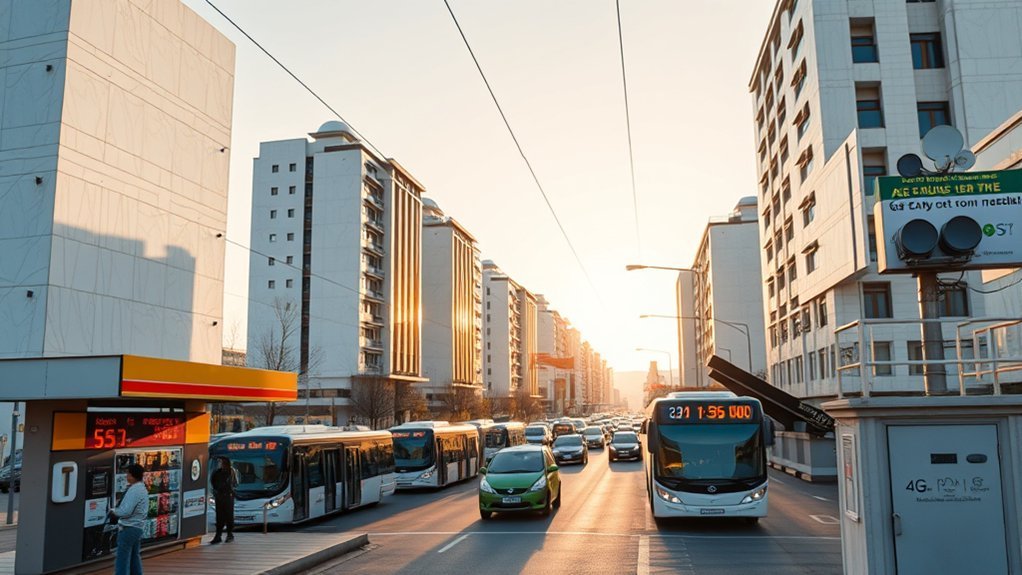
You’ll find local transit in Turkmenistan is very cheap — a one-way ride runs about $0.14 and a monthly pass near $8.52, which makes daily commuting far less expensive than in many countries.
Utilities for a standard apartment average roughly $47.30 per month, so housing-related bills stay fairly modest.
Internet is pricier by comparison, with 50 Mbps+ plans typically costing about $103 monthly, so factor that into your connectivity budget.
Local Transit Fares
Transit in Turkmenistan is affordable and straightforward: a single local-transport ticket runs about 0.50m while a monthly pass is roughly 30.00m, making regular commuting inexpensive compared with many regional capitals.
You’ll find local transit fares predictable and the service basic but reliable for city travel. Taxis cost more—starting at 10.00m plus distance—so you’ll use them for convenience or off-hour trips.
Fuel is cheap (about 1.50m per liter), which affects taxi and private-car costs. You should plan based on frequency and distance: short daily commutes favor monthly passes; occasional riders stick with single tickets or taxis.
- Monthly pass is best value for daily commuters
- Single tickets suit irregular travel
- Taxis add flexibility at higher cost
- Fuel prices lower private transport expense
Internet and Utilities
Although utility bills are broadly predictable, your monthly household costs will be driven by a fixed utilities charge and your choices for connectivity, with basic utilities for an 85 m² apartment set at about 2,000.00m while internet and mobile plans vary: a 10 GB mobile plan runs roughly 200.00m (100.00m–230.00m), and home broadband at 60 Mbps+ averages 360.00m (280.00m–500.00m).
You’ll pay the 2,000.00m fixed utilities regardless of use, so compare bundles to avoid surprises. For mobile data, low-use profiles fit the 100.00m–200.00m range; heavy streaming nudges you toward the top.
Broadband at 360.00m gives reliable speeds for remote work, but premium packages hit 500.00m. Factor in transport or fuel if you commute; a monthly pass is 30.00m and petrol about 1.50m/l.
Salaries, Purchasing Power, and Affordability

With an average monthly net salary of about 2,625.00m after tax, you’ll want to compare income directly to local prices to judge affordability.
Because a one-bedroom city-center apartment averages roughly 3,950.00m and overall costs run 1.57 times the world average, your real purchasing power can be strained despite nominal wages.
Factor in a 9.50% mortgage rate and any expat allowances to see whether housing and everyday expenses will be manageable for you.
Average Net Salaries
On average, you’ll earn about $748 a month in Turkmenistan, which covers roughly 42% of the typical $1,793 monthly cost of living and leaves purchasing power about 1.57 times below the world average.
For practical planning, recognize that average net salaries won’t comfortably meet local expenses; you’ll need strict budgeting or supplemental income.
Compared with regional peers, wages lag while housing and utilities rise, squeezing disposable income. If you’re evaluating moves or contracts, assess allowance structures and local rental markets closely.
- Expect salary to cover less than half basic monthly costs
- Prioritize housing trade-offs if living in Ashgabat
- Budget for utilities and food first
- Negotiate expatriate packages to bridge gaps
Real Purchasing Power
Because your average monthly net salary of about 2,625m falls well short of common urban costs, you’ll find real purchasing power is tightly constrained in Turkmenistan.
You’ll need to prioritize spending: city-center rent alone (3,000–7,000m) already exceeds your salary, so affording housing without subsidies or shared living is unlikely.
Utilities around 2,000m further erode disposable income, leaving little for food, transport, or savings.
Buying property is even harder—the 16,666.67m/m² price signals high long-term housing costs relative to wages.
With a cost of living 1.57 times the world average, your earnings won’t stretch as far as in many countries.
Practically, you’ll seek cheaper neighborhoods, roommates, or supplemental income to restore affordability.
Tips for Expats and Budgeting in Turkmenistan
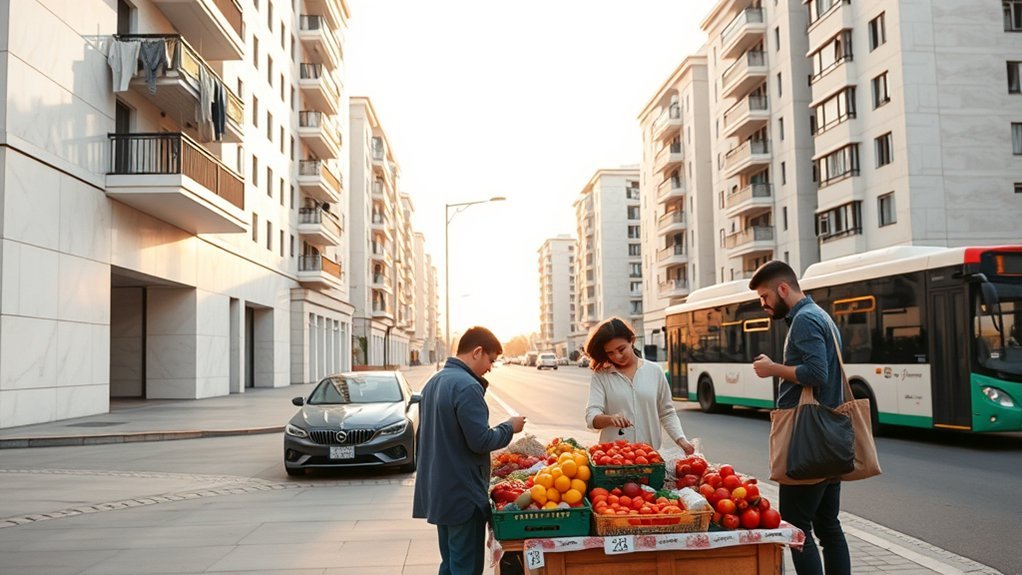
Plan to budget roughly $1,793 a month if you want a comfortable expat lifestyle in Turkmenistan, about 1.57 times the global average, and adjust expectations if your local income is closer to the national after-tax average of $748.
Plan for about $1,793/month for a comfortable expat life in Turkmenistan; adjust if your income is nearer $748.
You’ll find living costs skew toward rent and dining: city-center one-bed rents run $1,015–$1,770, while outside options start near $673. Dining for two at a mid-range restaurant is about $84.9, and lunch menus average $27.3, so eating out frequently raises monthly spend fast.
Transportation is cheap—single tickets $0.14, monthly passes $8.52—so prioritize public transit to save.
Use targeted budgeting strategies to stretch income relative to local prices:
- Choose housing outside the center or negotiate longer leases to lower rent.
- Limit mid-range dining; cook with local markets for groceries.
- Use monthly transit passes and occasional taxis for convenience.
- Track monthly expenses against the $1,793 target and adjust discretionary spending.
Frequently Asked Questions
Is Turkmenistan Cheap or Expensive?
It’s relatively expensive for locals: you’ll pay above-global-average costs, with high city rents and pricey dining, while transport stays cheap; your salary often won’t stretch far, so you’ll feel cost pressure despite some affordable services.
Is Turkmenistan a Good Country to Live In?
Not really — you’ll face limited livability, high housing and dining costs in Ashgabat, and modest salaries, though transport’s cheap; compared to many countries, quality of life and affordability are challenging unless you have strong financial support.
How Much Is a Meal in Turkmenistan?
About 110 manat for a mid-range meal for two—cheap or pricey depending on your expectations—while fast food can be around 300 manat, local beer 45 manat, cappuccino 42.5 manat, wine about 150 manat.
What Is the Salary in Turkmenistan?
You earn about 2,625 manat net monthly on average, but that’s often below living costs; salaries vary by profession, location, and sector, and expatriates usually get higher pay than local public-sector workers.
Conclusion
You’ll find living in Turkmenistan cheaper than many Western countries, but not uniformly so — rent in Ashgabat can surprise you, while groceries and local transport stay modest. If you’re comparing salaries and buying power, expect lower wages to balance out low everyday costs. Plan for bureaucracy and limited options, pack patience, and budget a cushion for sudden price shifts; pay attention to housing choices, and you’ll avoid most shocks.

